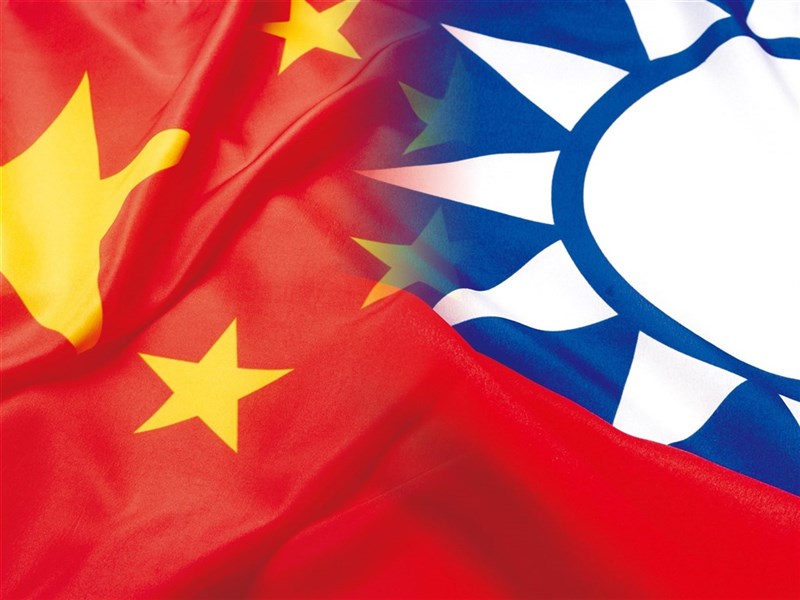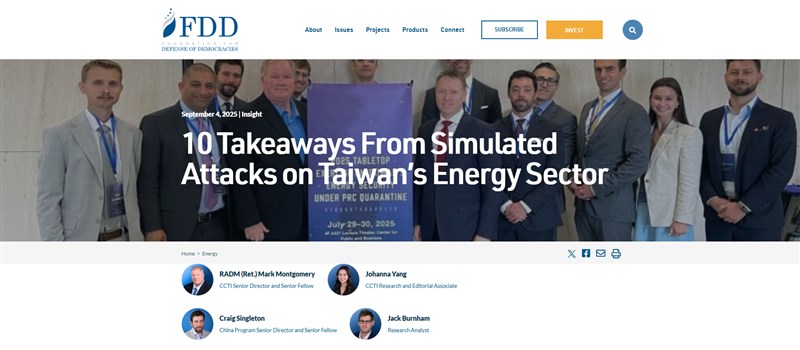Taiwan's reliance on Qatari LNG could be exploited by China: Think tank

Washington, Sept. 7 (CNA) A United States-based think tank has urged Taiwan to address vulnerabilities in its energy sector, warning that Qatar, a major liquid natural gas (LNG) supplier to Taiwan, could be susceptible to Chinese pressure to halt LNG shipments.
The Foundation for Defense of Democracies (FDD) made the recommendation following a two-day tabletop exercise it held in July simulating Chinese attacks on Taiwan's energy sector, which was conducted with experts from Taiwan, Japan, Australia and the United Kingdom.
The exercise explored a cyber-enabled economic warfare (CEEW) campaign by China to disrupt or block Taiwan's LNG and coal imports, using diplomatic, economic and intelligence tools backed by military pressure.
In a report published Sunday, the FDD noted that around half of Taiwan's electricity is generated by LNG. The fact that all of Taiwan's LNG and coal are imported, combined with limited storage capacity, pose strategic risks, it said.
"The CCP's heavy use of CEEW, selective maritime quarantines, and diplomatic pressure on Taiwan's energy providers would allow China to easily put Taiwan in extremis," the report said.
A loss of Taiwan's LNG supply, the FDD said, would force Taiwan to decide between prioritizing electricity for households and hospitals or its semiconductor industry, which is key not only to its economy but its leverage in global diplomacy.

The report urged Taiwan to rethink its dependence on Qatar for 30 percent of its LNG imports, due to Doha being "susceptible to Chinese pressure."
Instead, Taiwan should lock in U.S. energy contracts "even at a cost premium," build more capacity for LNG storage, develop more renewable capacity, including possibly restarting its shuttered nuclear plants, and invest in better grid design and security, the FDD said.
The report said that throughout its tabletop exercise, China maintained control of the pace of escalation as well as the international narrative.
In order to counter this advantage, it said, Taiwan's partners -- including the U.S., Japan, Australia and Europe -- should make clear that such actions by Beijing would engender a global response, as well as provide economic support to boost Taiwan's energy, cyber and societal resilience ahead of a crisis.
The U.S., specifically, could increase LNG sales to Taiwan, as well as signaling to energy-producing nations that it will happily take their place in selling to Taiwan if they succumb to pressure from Beijing, the report said.
Meanwhile, Australia -- which already supplies 40 percent of Taiwan's LNG -- and Japan could play an important role in shipping and storing LNG for Taiwan during a crisis, while Europe could work with its maritime insurance companies to develop a shipping insurance response to any future conflict, the report said.
According to Taiwan Power Co., natural gas accounted for 47.2 percent of Taiwan's energy mix in 2024, followed by coal at 31.1 percent, renewables at 11.9 percent and nuclear at 4.7 percent. Other sources, including pumped-storage hydroelectricity and oil, accounted for the remainder.
Nuclear power was phased out in Taiwan with the closure of its last operational reactor in May, fulfilling a policy goal of the Democratic Progressive Party-led government.
Taiwan's state-run CPC Corp. signed a 27-year LNG supply deal with QatarEnergy in June 2024.
-
Culture
Turning research into art: Graphic novel on Chinese migrant women in Taiwan
03/05/2026 02:55 PM -
Business
Taiwan shares close up 2.57%
03/05/2026 01:52 PM -
Sports
Taiwan loses to Australia 3-0 in WBC Pool C opener
03/05/2026 01:49 PM -
Society
Yushan covered in 5 cm of snow; temperatures forecast to rebound Thursday
03/05/2026 12:14 PM -
Society
Taiwan headline news
03/05/2026 11:34 AM